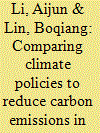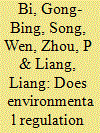| Srl | Item |
| 1 |
ID:
124506


|
|
|
|
|
| Publication |
2013.
|
| Summary/Abstract |
Currently, China is the largest carbon emitter mainly due to growing consumption of fossil fuels. In 2009, the Chinese government committed itself to reducing domestic carbon emissions per unit of GDP by 40-45% by 2020 compared to 2005 levels. Therefore, it is a top priority for the Chinese government to adopt efficient policy instruments to reduce its carbon intensity. Against this background, this paper develops a general equilibrium model and seeks to provide empirical contributions by comparing the potential impacts of several different policy options to reduce China's carbon emissions. The main findings are as follows. Firstly, these climate policies would affect the structure of economy and contribute to carbon emissions reduction and carbon intensity reduction. Secondly, there would be significant differences in the economic and environmental effects among different climate policies and hence, the government would trade-off among different economic objectives to overcome any potential resistances. Thirdly, there would be considerable differences in the emissions effects of absolute and intensity-based carbon emissions controls, implying that the government might adopt different climate policies for absolute or intensity-based carbon emissions controls. Looking ahead, the government should trade-off among different objectives when designing climate reforms.
|
|
|
|
|
|
|
|
|
|
|
|
|
|
|
|
| 2 |
ID:
128027


|
|
|
|
|
| Publication |
2014.
|
| Summary/Abstract |
Data envelopment analysis (DEA) has gained much popularity in performance measurement of power industry. This paper presents a slack-based measure approach to investigating the relationship between fossil fuel consumption and the environmental regulation of China's thermal power generation. We first calculate the total-factor energy efficiency without considering environmental constraints. An environmental performance indicator is proposed through decomposing the total-factor energy efficiency. The proposed approach is then employed to examine whether environmental regulation affects the energy efficiency of China's thermal power generation. We find that the environmental efficiency plays a significant role in affecting energy performance of China's thermal generation sector. Decreasing the discharge of major pollutants can improve both energy performance and environmental efficiency. Besides, we also have three main findings: (1) The energy efficiency and environmental efficiency were relatively low. (2) The energy and environmental efficiency scores show great variations among provinces. (3) Both energy efficiency and environmental efficiency are of obvious geographical characteristics. According to our findings, we suggest some policy implications.
|
|
|
|
|
|
|
|
|
|
|
|
|
|
|
|